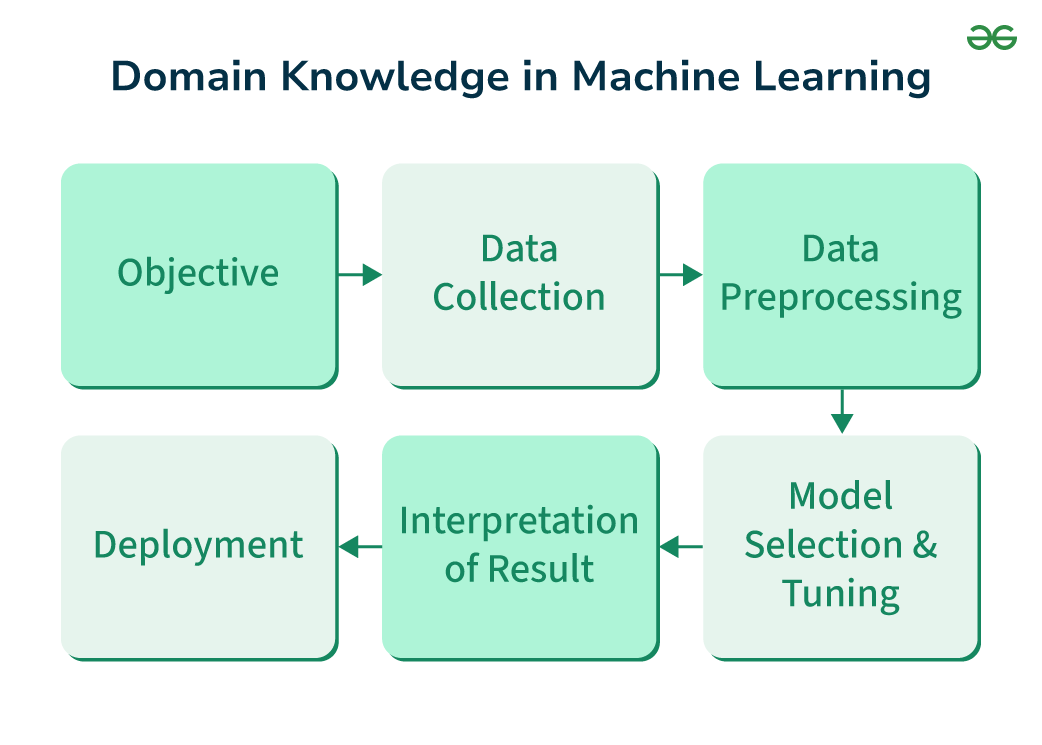Domain Knowledge in Machine Learning
Domain Knowledge in machine learning refers to expertise and understanding of the specific field or subject matter to which the machine learning model is applied. While machine learning algorithms are powerful tools for analyzing data and making predictions, they often require domain experts to ensure that the models interpret the data correctly and make meaningful predictions.

In this article, we will explore the Significance of Domain Knowledge in Machine Learning and How it influences every stage of the machine learning pipeline .
Table of Content
- Introduction to Domain Knowledge in Machine Learning:
- Importance of Domain Expertise in Data Science and ML:
- How Domain Knowledge Enhances ML Models
- Case Studies
- Problems and Fixes for Including Domain Knowledge
- Tools and Techniques
- Sector-Specific Applications
- Conclusion
Introduction to Domain Knowledge in Machine Learning
Expertise in a particular sector or business, known as domain knowledge , is essential for machine learning (ML) and data science. This paper investigates the deep influence of domain knowledge on machine learning models, its significance in data science, and how it improves model performance. It also looks at case examples that highlight the importance of domain expertise, integration difficulties, and a range of instruments, methods, and industry-specific applications.
Domain Knowledge in Machine Learning Process
- Objective Definition: Domain experts is inegral throughout the machine learning process, from defining object to deploy models.
- Data Collection: Collecting relevant datasets from diverse sources is important, align with domain intricacies and data availability.
- Data Preprocessing: Cleaning, transforming, and encoding data to ensure quality and compatibility with the chosen machine learning algorithms.
- Model Selection & Tuning: Selecting appropriate algorithms and fine-tuning model parameters, Guided by domain knowledge to optimize performance and interoperability.
- Interpretation of Reults: Domain Experts interpret model outputs, validating prections against domain- specific knowledge and contextual understanding.
- Deployemnt : Deploying the trained model into prection environments, considering domain constraints and scalability requirements for real-world applications.
Importance of Domain Expertise in Data Science and ML
Domain knowledge directs the whole machine learning process, from data preparation to model deployment, in addition to helping to comprehend the underlying data. Domain specialists make contributions to ML by:
- Feature engineering: They find pertinent features and connections within the data, which helps to provide more insightful features for machine learning models.
- Model Interpretation: By comprehending the domain context, model predictions may be interpreted more effectively, increasing the actionability and reliability of machine learning outputs.
- Data preprocessing and cleaning: By spotting noise and abnormalities unique to a certain domain, domain specialists improve the quality of the data, which in turn improves model performance.
How Domain Knowledge Enhances ML Models ?
ML models benefit from domain knowledge by:
- Guiding the selection of features: Subject matter specialists can pinpoint the most important factors that influence prediction accuracy.
- Informing model interpretation: Interpreting model outputs and insights obtained from data is made easier by having a solid understanding of the domain.
- Increasing the performance of the model: Adding domain-specific knowledge may result in predictions that are more accurate and more generalized to real-world situations.
Case Studies
The following real-world instances show how domain knowledge affects machine learning projects:
- Healthcare: Using medical knowledge to identify important risk factors and symptoms aids in the prediction of patient outcomes, such as hospital readmissions. For instance, a hospital’s predictive model that was created with input from medical experts correctly identifies patients who are at a high risk of readmission, allowing for preventative measures.
- Finance: Financial domain knowledge helps fraud detection systems identify unusual patterns that point to fraudulent activities. For example, a financial institution employs machine learning (ML) algorithms that are augmented with fraud analyst experience to identify suspect transactions and stop fraud in real time.
- Manufacturing: To predict equipment breakdowns and improve maintenance schedules, predictive maintenance models make use of domain knowledge. Predictive maintenance algorithms are developed in an industrial facility by integrating technical information to minimize downtime and maximize operational efficiency.
Problems and Fixes for Including Domain Knowledge
Knowledge elicitation, model validation, and data heterogeneity are challenges in incorporating domain knowledge into machine learning operations. In order to enable the successful integration of domain expertise, solutions include multidisciplinary cooperation, knowledge elicitation methodologies, and model explainability approaches.
- Data Availability: Domain-specific data may be expensive or difficult to get. This difficulty may be lessened by working with subject matter experts and making use of other data sources.
- information Representation: Careful representation strategies, such ontologies or expert rules, are needed to translate qualitative domain information into quantitative inputs for machine learning models.
- Interdisciplinary cooperation: To guarantee mutual understanding and goal alignment, bridging the gap between data science and domain knowledge requires efficient communication and cooperation structures.
Other methods and instruments for using domain expertise in machine learning consist of:
- Ontology-based modeling: Formal representation of domain ideas, connections, and constraints is known as ontology-based modeling.
- Rule-based systems: To direct model behavior, domain-specific rules and heuristics are encoded.
- Knowledge graphs: Using linked items and connections to represent domain knowledge to improve comprehension and deduction.
- Bayesian networks: Using probabilistic graphical models to include domain knowledge for reasoning under uncertainty.
Sector-Specific Applications
Apart from healthcare, finance, and manufacturing, domain knowledge has a significant impact on machine learning applications across other industries:
- Retail:Supply chain optimization , tailored suggestions, and demand forecasts.
- Energy: Forecasting renewable energy sources, optimizing energy use, and predictive maintenance for power plants.
- Transportation: Autonomous vehicle navigation, route planning, and traffic forecasting.
- Telecommunications: Fraud detection, customer churn prediction, and network optimization.
Conclusion
Building solid machine learning solutions that tackle real-world problems in a variety of disciplines requires domain expertise. Data scientists may improve model performance, interpretability, and application by using knowledge from many domains, which encourages creativity and adds value to machine learning applications.


